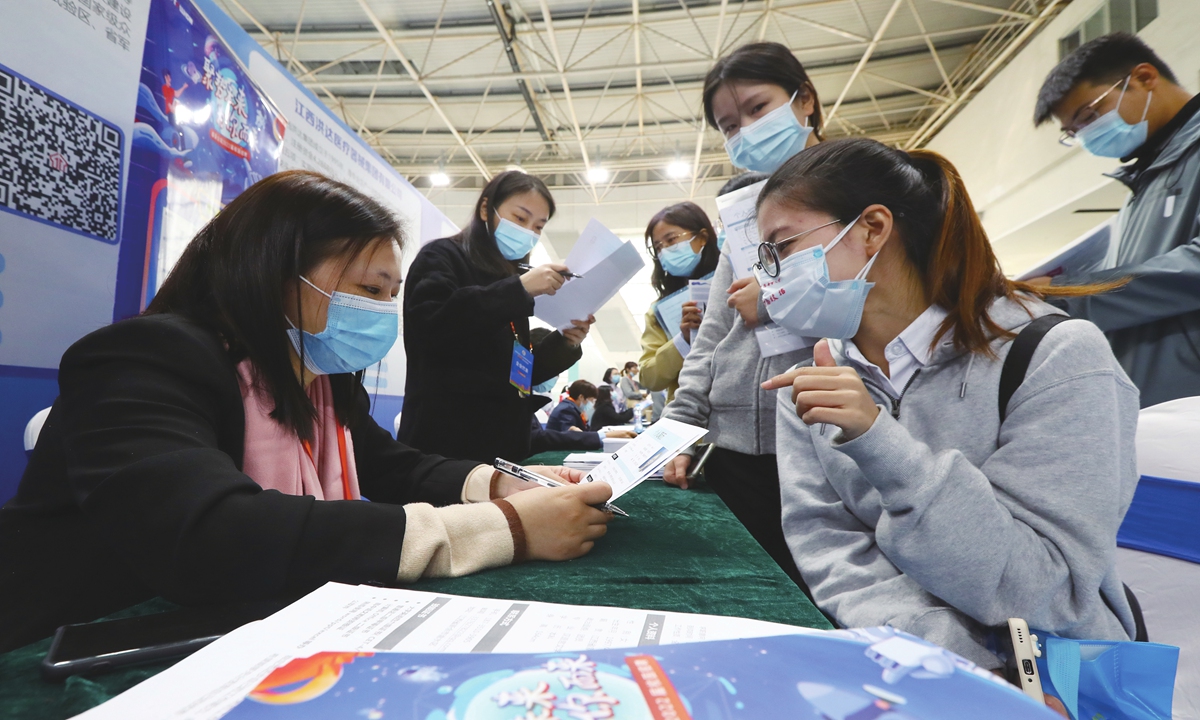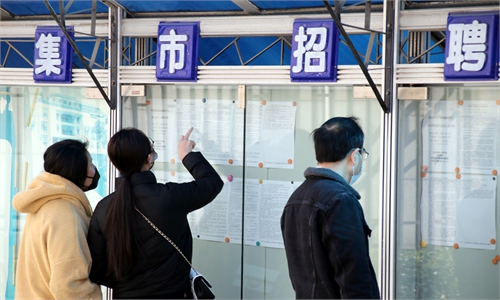China’s college grads seek SOEs with preferences shifting to stable jobs
College grads eye stability in uncertain labor market

A student (right) asks questions at a job fair in Nanchang, East China's Jiangxi Province on October 23, 2021.About 10.76 million college graduates in China are estimated to enter the job market in 2022.Photo:cnsphoto
A graduating university student surnamed Zhang had her heart set on joining a major foreign firm in China, but she recently changed her mind and has signed up for the country's civil service exams as well as applying for positions at state-owned enterprises (SOEs) including banks and energy firms.
"Many foreign companies now are facing uncertainties caused by the pandemic, so I prefer a more stable job, despite more competition and pressure," Zhang told the Global Times on Tuesday.
Zhang is among more than 10 million college graduates in China in 2022 - a record high - striving to find a dream job amid increased employment pressure.
Surveys on college graduates by different market institutions have shown that, under the employment pressure created by the epidemic, a bulk of college graduates are listing state-owned enterprises and jobs in the civil service as their first choice for employment.
In 2021, China's economy achieved a stable recovery, with increasing development momentum and renewed business activity among major market players, which has provided a strong guarantee for the overall stability of the domestic labor market, Wang Pingping, a senior official from the National Bureau of Statistics said.
However, Wang noted that new graduates will still face challenges and pressure due to a series of factors including national economic pressures as well as the ongoing epidemic, which has caused the fluctuation of the employment demand across some industries and enterprises.
New challenges, higher pressure
According to Wang, in 2022, China will produce 10.76 million college graduates, an increase of 1.67 million over the previous year, a new record high.
Moreover, the long-standing structural contradictions of "difficulty in recruiting" and "difficulty in finding jobs" within the job market have not been fundamentally alleviated, Wang added.
"Some private companies and emerging firms are facing the shortage of employees, especially talent in the secondary and tertiary industries like medium and senior skilled workers; while some SOEs have too many applicants," Zhang Yi, CEO of iiMedia Research Institute, told the Global Times on Tuesday.
Zhang said as the country accelerates its industrial upgrade, the shortage of talent in some industries will continue to increase, noting that the imbalanced supply and demand for talent may also complicate the labor market in 2022.
Analysts noted that the government's policies may also have an impact on recruitment market.
For instance, the number of positions in the education sector available for graduates has continued to fall since October 10, according to a report released by the China Institute for Employment Research (CIER) and Zhaopin.com, a job platform, shared with the Global Times, due to the country's tightening regulations on the child tutoring sector.
Moreover, at the end of last year, many Chinese tech enterprises including ByteDance, iQiyi and Kuaishou announced layoffs as they adjust their business models.
Wang said entering November 2021, there were more departures in industries including construction, manufacturing, accommodation and hospitality, internet and education, leading to the increase in the overall unemployment rate.
Preferential choices
Facing uncertainties created by the COVID-19 epidemic, an ever-growing number of college graduates are stating a preference for job stability often associated with SOEs and the civil service.
"I used to want to work at a foreign company or become a teacher as I studied a foreign language, but now I have changed my mind," a Beijing college student surnamed Yao who found job through taking the national civil service exam in 2021 told the Global Times on Tuesday.
"Two-thirds of my classmates have taken the civil service exam, all of us wanted a stable job during the epidemic despite fierce competition," Yao added.
In 2021, more than 2 million people applied to join China's civil service, with 68 people on average competing for each position. Meanwhile, the number of job applications for SOEs also rose significantly, according to the report released by the CIER.
Zhang said that at present, many college students will pursue a job with higher salary and better atmosphere, and jobs at SOEs and civil service institutions can provide a better development prospect with less risk.
However, these companies and institutions only offer limited positions, and small and medium-sized enterprises (SMEs) can help support 80 percent of domestic employment pressure, experts noted.
"College students can broaden their eyes and diversify their job-hunting scope. For example, those who learn foreign languages can land a dream job at foreign trade companies, as the country's booming foreign trade sector can also provide them with a stable job," Zhang said.
An employee surnamed Ren from a Shenzhen-based export company for a high-tech medical equipment told the Global Times that the firm, which has gained the country's support, has expanded recruitment, offering more than 100 positions with a base salary reaching 13,000 yuan ($2,054) per month, alongside with generous welfare as well as offering insurance and government stipulated housing fund payments.
In 2021, China's exports hit a new record. The total trade volume of cross-border e-commerce soared nearly 10-fold over 5 years, and continued double-digit growth, Shu Jueting, a spokesperson from China's Ministry of Commerce said.
Zhang noted that employing companies especially SMEs should also adjust their recruitment policies including increasing incomes on offer as well as improving the work space, in a bid to attract more talent.

